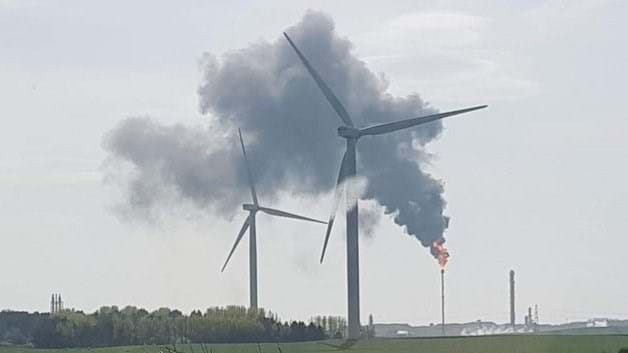ExxonMobil fined £176,000 for ‘preventable’ flaring at Mossmorran in 2019

EXXONMOBIL has been fined £176,000 (US$232,000) over a “preventable and unacceptable” week-long period of continuous flaring at its Mossmorran plant in Scotland in 2019.
In a court hearing this week, the US petrochemical giant pleaded guilty to charges that it exceeded pollution limits and failed to operate the Fife Ethylene Plant (FEP) according to its own standard procedures.
The Scottish Environment Protection Agency (Sepa) began investigating ExxonMobil after a six-day period of unplanned flaring in April 2019 prompted over 900 complaints from local residents – more than Sepa has received for any other incident.
Continuous elevated flaring was triggered by a cable failure in a steam-generating boiler, forcing the shutdown of the plant’s steam cracker as several other boilers were already switched off for maintenance.
Sepa’s investigation found that ExxonMobil’s maintenance scheduling was poor, and that employees had a lack of understanding of the steam balance required for the plant to operate. The agency also found that ExxonMobil had processes in place that could have prevented the incident, but that “they were not followed to a high enough standard”.
Flaring is a routine safety mechanism at petrochemical plants that involves burning excess gas to relieve pressure, but there are strict environmental limits on it to minimise air pollution. ExxonMobil’s permit at Mossmorran restricted flaring to no more than 15 minutes at shade 2 on the Ringlemann scale, where 0 represents clear air and 5 is “complete black smoke”. Sepa’s investigation found that during the continuous flaring in April 2019, ExxonMobil released shade 4 smoke for 110 minutes.
Sepa’s air quality monitoring at the time confirmed no significant health impacts as a result of the flaring. The local health service reported that the incident caused “a considerable degree of physical and psychological disturbance” to local residents, who had reported sleeping difficulties and fears of an imminent explosion. Ross Haggart, Sepa’s chief operating officer for regulation, business and environment, said the disruption was “simply intolerable”.
Both Sepa and the Crown Office and Procurator Fiscal Service (COPFS), the prosecutor in the recent trial, described the incident as “unacceptable and preventable”. Ian Batho, environmental lead at COPFS, said: “The conviction in this case highlights that large global companies will ultimately be held to account for breaches of environmental legislation in Scotland and recognises the significant impact that this incident had on local communities.”
However, Linda Holt, a spokesperson for the Mossmorran Action Group, said the process had been “far too weak and far too slow”, and that “it took years for enforcement to catch up with a week-long flaring event that caused extreme noise and light pollution, sleepless nights, and genuine fear among residents who live beside the plant”.
Holt also criticised the size of the fine issued to ExxonMobil, describing it as a “drop in the ocean” when compared to the £140m the company has since invested in upgrading Mossmorran.
An ExxonMobil spokesperson said: “We regret and apologise to local communities for the impact of the flaring event in 2019”. The company added that upgrades at Mossmorran have since reduced elevated flaring by over 99%.
Maintained concerns
Concerns about ExxonMobil’s maintenance scheduling at Mossmorran have persisted since 2019. In 2023, around 200 contractors downed their tools because safety alarms were not working properly.
Then in March this year, ExxonMobil was served an improvement notice by the UK Health and Safety Executive (HSE) after the company had failed to maintain the warm drain header pipework system at Mossmorran, which had resulted in “widespread corrosion of the system, giving rise to an unacceptable risk to operators” should a failure in the pipework have led to a hydrocarbon release.
ExxonMobil has now complied with HSE’s order to improve the pipework. When the notice was served, an ExxonMobil spokesperson said: “We operate to the very highest safety and risk management practices, and work closely with the HSE in achieving compliance with applicable legislation, standards and guidance.”
Recent Editions
Catch up on the latest news, views and jobs from The Chemical Engineer. Below are the four latest issues. View a wider selection of the archive from within the Magazine section of this site.




